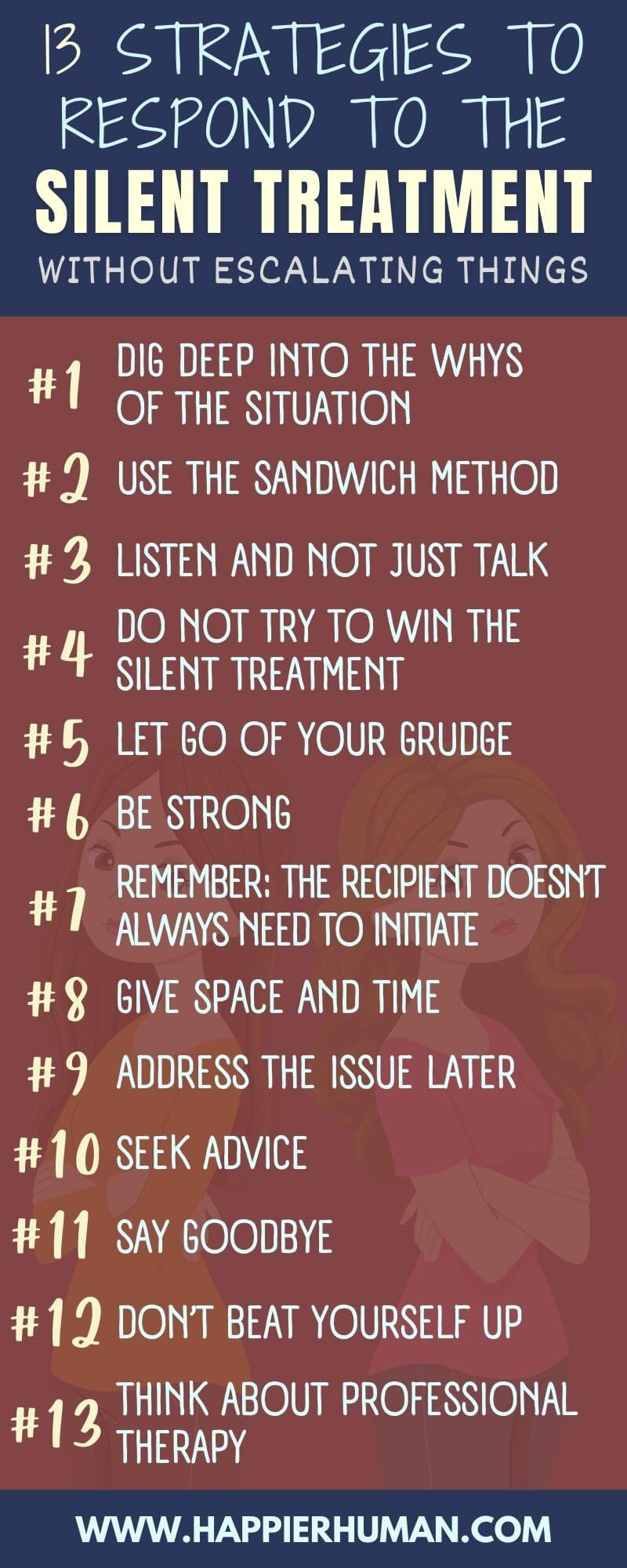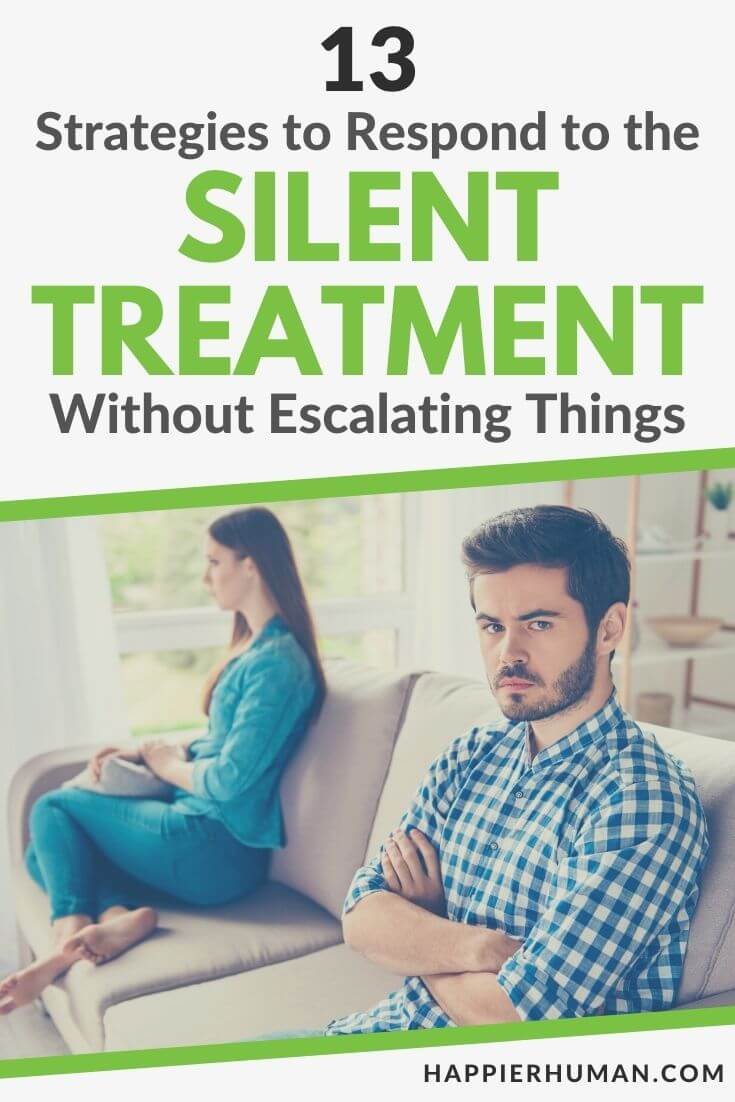Have you ever been in a situation where you wanted your partner to talk to you but they did not? Have you ever ended a conversation with silence?
If so, then you have experienced what’s commonly known as “the silent treatment.”
The silent treatment is a manipulative way to inflict pain on someone without visibly bruising them. It can be damaging if left unaddressed and cause a lot of unhappiness in your relationship.
In this article, you will learn more about what the silent treatment is and get 13 strategies on how to respond to the silent treatment effectively and without turning the conversation into a major argument.
What Is the Silent Treatment?
Make no mistake about it the silent treatment is a form of abuse and manipulation. We have all been on the receiving end a time or two. I know I have. Many of us have even used this tactic now and then. I know I have.
The silent treatment, a passive-aggressive tactic, is used to get your spouse, boyfriend or girlfriend to take notice of your sorrow, anger, or disappointment without words, with the intention of leaving the partner confused, lonely, and hurt.
This manipulative form of avoidance can be used with bosses, colleagues, family, friends, or partners, but seems most powerful coming from significant others. But when people overuse this manipulative tactic it goes from, “What did I do“, to “What is he/she upset about NOW” a subtle but important difference.
Why Do People Use the Silent Treatment?
Silence is a weapon. And it can be an abusive one. Those who use silent treatment repeatedly have some or all of the characteristics listed below:
If there are people in your life who have such characteristics and often give you a cold shoulder, please know that you are not powerless and there are ways to handle them.
How to Win the Silent Treatment
There is “winning” the silent treatment. You can't ‘out silent' your opponent and communication is key to any healthy relationship. Winning the silent treatment involves addressing the lack of communication with empathy and effective communication strategies rather than letting disagreements fester into resentment.
Instead of mirroring the silence or resorting to confrontation, approach the person calmly to understand their feelings, as the silent treatment is often a form of emotional abuse meant to express frustration or guilt.
Therapists suggest that acknowledging the other person’s feelings and fostering open dialogue can break the cycle, promoting emotional well-being. If needed, counseling can provide tools to navigate such conflicts constructively, ensuring both parties feel heard and valued.
In short, try to avoid a heated argument and use tools for healthy communication.
How to confront someone giving you the silent treatment?
In the next section I will list various specific methods to deal with this situation if you are on the receiving end of the silent treatment. So this section will be more of a “general” method of dealing with the silent treatment.
Confronting someone giving you the silent treatment requires direct communication and a focus on understanding the underlying issues driving their behavior. Approach the interaction in a healthy way by choosing a calm moment to express how their silence affects you, avoiding blame to prevent escalating negative emotions.
Ask open-ended questions to uncover the root of their withdrawal, which may stem from unresolved relationship dynamics. Offering a sincere apology or suggesting ways to make amends can help bridge the gap, reducing feelings of isolation and fostering a constructive dialogue that strengthens the connection.
How to Counter the Silent Treatment
These simple actions will help you deal with silent treatment in any kind of relationship.
#1. Dig Deep Into the “Whys” of the Situation
Just as personal development and growth hinges around “understanding your whys” so to does a successful relationship revolve around a mutual understanding of your partners, “whys”.
Never assume that you know the reason for the silent treatment you are receiving. For example, you cannot simply figure out what is going on in your boyfriend’s mind. You need to ask and hopefully get a real answer.
Also, not all people use the silent treatment out of malice. For instance, your mother will never stop talking to you for the express purpose of emotionally harming you or inflicting pain upon you.
It is possible that she has trouble expressing herself. Maybe she does not want you to know something she did against your will and is afraid of your reaction.
However, there are abusive relationships where it is done out of malice. Like in relationships with narcissists. They only care about gaining control and power over you.
Regardless, if you want to handle the silent treatment calmly breaking through their stonewalling will always be your first step. You need to understand the “why”.
#2. Use the Sandwich Method
Do not imitate what they are doing. Remember that silence can never be a solution to the silent treatment. Use of the silent treatment by both parties is just a relationship with horrible communication. nothing good comes of it!
Always approach them directly but in a calm and gentle manner. Take a deep breath, clear your mind, and talk in a private place.
Initially, they may not not talk but you will have to make them speak up. But do not force them, or get angry if the intial response id “Nothings wrong”. Your attempts at having a conversation with them will eventually break their silence.
Use the sandwich method. It is a technique for giving constructive criticism in which you use “I” statements to convey your feelings and demand an explanation.
However, do not make it all about yourself. Incorporate how it is negatively affecting the both of you. Try to make eye contact as much as possible.
It is okay if what you say triggers anger in them. Your job is to get a response from them and have them speak up. Do not interrupt them and try to keep them calm.
For example, a conversation with your girlfriend to break through the silent treatment may look like this:
“Sweetheart, I love you and I want our relationship to work. I, and I am sure you too, want us to be happy and supportive of each other. Please do not stop talking to me. It only leads to misunderstandings. I am always here to listen if something is bothering you. Is it something I did or say that hurt you?”
#3. Listen and Not Just Talk
Getting the silent treatment might trigger anger in you too and you may lose control over your tone. This defeats the purpose of your conversation.
So be ready to listen. Note that it is more important than talking when you are trying to coax, for example, your best friend.
Like I said earlier, do not interrupt. They are likely going to clam up if they sense that you are just looking to fight and take the floor. We often fail to realize where we stopped listening.
You might want to learn some empathetic listening skills.
#4. Do Not Try To Win the Silent Treatment
As mentioned earlier, if you make the silent treatment a game there are only losers. It should not be a blame game. Your goal should be to resolve the issue once and for all.
However, both parties should realize their mistakes and make it a point that they do not repeat them.
Acknowledge the other person’s emotions even if you are not the recipient of the silent treatment. Try to validate their experience. It lays the foundation for comfort, openness, and trust signaling towards the fact that you genuinely care about their feelings.
#5. Let Go of Your Grudge
Grudges can be devastating. Irrespective of which end of the silent treatment you are on, always be ready to ask and offer forgiveness.
If you are someone who has never apologized to someone, try it. You will feel so much lighter when your part of the job is done.
However, this is not an easy task. You do not realize but grudges leak out into other aspects of your life. Work on letting it go.
#6. Be Strong
One way to tackle the silent treatment is to act like you are unaffected by it even though it does. Do not let your weak side come out.
It may sound an unhealthy way of dealing with the situation. Please note that some people give the silent treatment to get a particular reaction out of you.
Acting like you are unaffected by the silent treatment is important when you are part of a power imbalance. Like a parent dealing with a child who is using the silent treatment.
But it is key when you are in the position of authority you awlays open lines of communiation. Saying something like, “Whenever you are ready to talk, please know I am always here.”
Keep it short, simple, and calm with a child. Your goal is to only make it clear that you do not allow silence as punishment.
#7. Remember: The Recipient Doesn’t Always Need To Initiate
There is no such rule that the conversation can only be started by the recipient. If you the one giving the cold shoulder, you can go up to the one at the receiving end.
Assuming that it is a friend, you can go like “I know I have been quiet and it is not fair to you. I need you to know that I am not in the right headspace right now. All I ask for is some time and space. I will talk once I feel I am ready.”
Effective communication skills always help. Try to make yourself a better communicator every day. Keep an eye on your goal of building healthy relationships.
[Want some great ideas for parenting. Find out what Positive Parenting Solutions is all about, and why it should matter to you, in this detailed review]
#8. Give Space and Time
They say that “time heals all wounds”. I am not sure I agree, 100%. But when you are angry sometimes you need some time to calm down.
A silent friend or partner may demand space and time, just like in the instance mentioned above. Try not to think about it and preoccupy yourself with other activities until they are ready to talk.
Make sure that the one who is not responding to you knows that you are expecting an explanation.
#9. Address the Issue Later
Sometimes the issue remains unresolved but things get back to normal. When the time is right, sit with the aggrieved person who is giving you the silent treatment and revisit the situation.
Since some time has passed, the hostility would be somewhat reduced. You can probably clear things out now. You need to do this because the issue is still very much there it is just not out in the open.
You can end such conversations by letting the other person know that you do not appreciate the lack of communication and how it is detrimental for both of you.
#10. Seek Advice
You might also want to seek advice especially if it is a boss-subordinate relationship. You do not want your work to suffer because your relationship with your boss or colleagues is not good.
Ask someone who has dealt with a fellow employee or boss who is sulking or silent. They might know how to respond to the silent treatment you are getting at your workplace.
Avoid phrases like “Is there something wrong” because the most common response to such questions is “No.” You will want to say something like this, “I have been noticing that you are not talking much at the meetings lately. Please let me know what the problem is. I am always here.”
Always talk to someone close to you, someone willing to help you organize your thoughts.
#11. Say Goodbye
I understand it is easier said than done. But if you are constantly getting the silent treatment and you have had enough, you may need t end your relationship. Do not let it mentally affect you till the point you cannot take it anymore.
Whether it is a romantic relationship or a professional one, start with stating your boundaries. You might want to say, “I cannot continue with this relationship if you keep shutting me out. The silent treatment is too toxic for me. I will have to call things off if it continues.”
Say the above if you feel there is still a chance. But do follow through if they do it again.
Sometimes when you are confronted with a toxic person in you life the best thing to do is just get some separation from them.
#12. Don’t Beat Yourself Up
Take care of yourself. Do not let the silent treatment get to your head. Do not beat yourself up for not reading someone’s mind.
Receiving the silent treatment for a prolonged period can often lead one into depression. Globally, more than 300 million people of all ages suffer from depression.

To keep yourself healthy, eat well, meditate, surround yourself with positive people, and try not to be alone. Check out How to Meditate: A Complete Guide for Beginners for some excellent tips on meditation.
Love yourself first and keep reminding yourself of your worth. You are smart, capable, and powerful. Do not let anyone convince you otherwise. Click here to learn about the 16 ways to forever change your life’s potential.
#13. Think About Professional Therapy
Let me reiterate that the silent treatment is emotional abuse. If you feel it’s taking a toll on you, seek professional help. You might also ask the person giving you the silent treatment to join you. They will most likely refuse. But you go ahead and book an appointment.
The thing with psychologists or counselors is that they keep their personal biases and judgments aside. They keep themselves from talking until you have shared every bit of your story.
This will also keep you from taking any medications that you are taking for stress and anxiety. Consider solutions that are healthy and manageable in the long run.
Final Thoughts on Countering the Silent Treatment
When responding to the silent treatment, there are certain things that you should avoid which include the following:
Remember all the times when your silent boss or anyone else for that matter was nice to you. Do not let just one or two instances of a bad coping mechanism ruin your relationship.
These silent treatment tips are neither exhaustive nor magical.
Please bear in mind that all that I talked about in this article is situational. It is not necessary that everything applies to you. You are the best judge of your problem.
Now, if you want additional strategies to improve your relationship, then you might want to create what are called “core values” with your significant other. Here are 11 examples of relationship core values you can make.
As a final word, if you are encountering physical abuse from a family member or significant other please contact the national domestic violence hotline
Check out more articles about handling bad relationship issues:
- 13 Steps to Get Along with Difficult People
- Is My Mom Toxic? 15 Signs of a Toxic Mother
- 21 Effective Strategies to Stop Interrupting People
- 7 Long-Term Benefits and Advantages of Group Therapy
- 19 Weird Things That Narcissists Do to Manipulate People
- 11 Steps to Deal with Upstairs Neighbors Stomping & Making Noise


